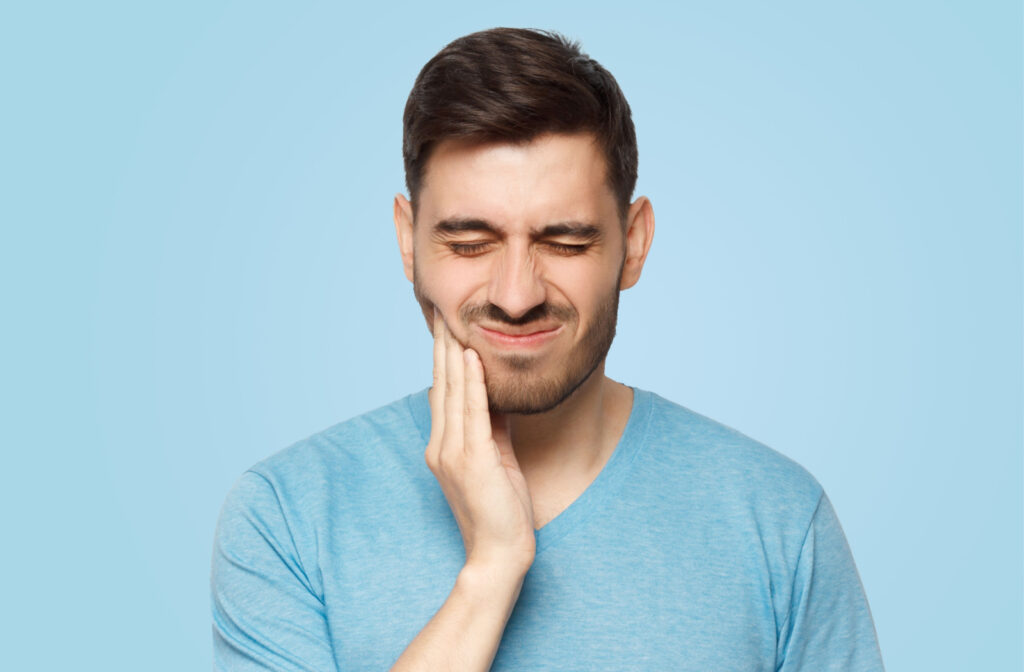Jaw tenderness, jaw fatigue, headaches, or pain can be a sign of a common condition known as TMJ dysfunction (TMD). Your TMJ, or temporomandibular joint, is the joint that connects your jawbone to your skull.
TMD and tooth pain are interconnected and can be symptoms of injuries, teeth grinding, and infections. A comprehensive diagnosis from your dentist can help identify and treat the underlying cause of your TMD and tooth pain to restore proper function and comfort to your mouth.
What Is Temporomandibular Joint Dysfunction?
The temporomandibular joints are complex. They allow your jaw to move up and down, side to side, and back and forth and are made up of muscles, ligaments, articular discs, and bones that work together to facilitate these movements. When the joints don’t function properly, it can cause TMD and pain.
TMD is categorized as a:
- Jaw joint disorders
- Chewing muscle disorders
- TMJ dysfunction-related headaches
Symptoms of TMJ Dysfunction
TMD pain can manifest itself in several ways, and common symptoms include:
- Tenderness in the jaw, often radiating to the neck
- Difficulty in opening or closing your mouth
- Swelling around the joint
- Clicking or popping in your jaw
- Jaw stiffness
- Jaw locking
- Headaches and migraines
- Toothaches
- Earaches and tinnitus
- Malocclusion or misalignment of the bite
Causes of TMJ Dysfunction
The exact cause of TMJ discomfort is not always clear, and there’s often no singular cause. It’s often linked to factors like:
- Injury or trauma to the jaw
- Bruxism, or clenching and grinding of the teeth at night
- Arthritis in the jaw joint
- Malocclusion
- Stress and anxiety
- Improper jaw development
- Breathing disorders
Speak with your dentist about any concerns you have about TMD. They can work with you to identify the potential causes and your treatment options.
TMD & Tooth Pain
When the TMJ isn’t functioning properly, it can put pressure on the surrounding nerves, particularly the trigeminal and/or facial nerves, causing referred pain (when you feel pain in a different area of your body than where the actual problem is) in the teeth. This pain may be sharp, dull, or achy and can be felt in the upper or lower teeth on one or both sides of the mouth alongside other TMD symptoms.
Can Toothaches Cause Jaw Pain?
Toothaches are often linked to:
- Tooth decay
- Gum disease
- Abscesses
- Cracked teeth
- Damaged fillings or crowns
- Bruxism
In some cases, toothaches can cause pain that radiates to the jaw. Toothaches can also be worsened by chewing or biting. The referred pain can be intense and debilitating.
Toothaches typically occur when the pulp of your tooth gets infected or inflamed. This inflammation can spread to the surrounding tissues, including the ligaments and bones that support the tooth’s structure. When this happens, the inflammation can cause pain in the jaw.
What Makes TMD Worse?

Certain activities or habits can exacerbate TMD symptoms, including:
- Clenching or grinding teeth during waking hours
- Chewing gum or eating hard foods
- Taking large bites of food
- Poor posture
- Using teeth as tools
- Life stress
Avoiding these triggers can help manage TMD symptoms and prevent them from worsening.
Diagnosing & Treating TMD
If you are experiencing tooth pain or other TMD-related symptoms, your dentist can help. They will examine your teeth and jaw, ask about your symptoms, and may take X-rays or other diagnostic tests to rule out other dental issues.
If TMD is causing your tooth pain, you have options. Your dentist may recommend a combination of effective therapies to soothe symptoms and improve your quality of life.
Nightguard
If you grind your teeth at night and wake up with jaw pain and headaches, your dentist may recommend wearing a nightguard to protect your teeth and jaw. Nightguards are custom fit to your bite using comfortable, durable material that can withstand the power of your jaw muscles. Nightguards can be used as a supplement with other treatments.
Physiotherapy/Chiropractic therapy
Treatments with a physiotherapist are effective in supporting healthy jaw function. They use a range of modalities to reduce your discomfort, including manual soft tissue work to release muscle tension in your neck and shoulders or electrical stimulation or ultrasound or manipulation of the cervical spine.
Relaxation Techniques
When TMD results from stress and tension, your dentist may encourage relaxation techniques to reduce symptoms. Popular relaxation techniques include:
- Breathing exercises
- Meditation
- Progressive muscle relaxation
- Guided imagery
- Improved self care
- Proper tongue posture
See a TMD/pain specialist
Some dentists, like FCDC’s own Dr. Klassen, have limited their practice to helping people overcome their TMD and chronic pain problems. They have specialized training and experience in diagnosing and treating these issues successfully.
Avoiding TMD
You can also do several things to avoid TMD, including:
- Avoiding hard or chewy foods
- Practicing good posture
- Relaxing your teeth and jaw throughout the day
- Stretching your jaw muscles
Diagnose, Manage, & Treat TMJ Dysfunction
With a thorough assessment from your dentist and the right combination of treatments, you can find relief and enhance your quality of life.Schedule an appointment at False Creek Dental Centre to discuss possible causes, treatments, and preventive measures to help avoid TMD.



